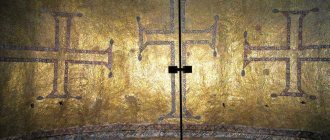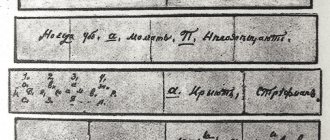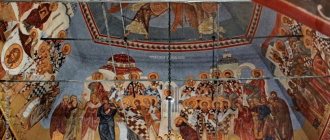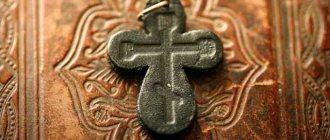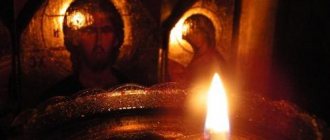Saint Helena
All ancient authors were unanimous that the emperor's mother was a girl from a simple family. The story of its origin goes back to the speech of Bishop Ambrose, delivered in 395 at the funeral of Emperor Theodosius. In it he talks about Helen's rise from low status to Augusta.
She is often referred to as a tavern maid or the tavern owner's daughter. Researcher Timothy Barnes analyzes word usage in Ambrose's speech and comes to the conclusion that Helen was the daughter of the owner of a mansio - a hotel that was intended for officials of the empire. The owner of such a hotel had a fairly high social status.
The question of Elena's marriage is also in question. Already in ancient times, authors opposed to the emperor emphasized his artistry. The 5th century church historian Philostorgius spoke disparagingly about Helen. The 6th century historian Zosimus called Constantine the fruit of an illegal union and contrasted him with the children of Constantius and his other wife Theodora. Both authors who lived later repeat the words of the historian Eunapius, who was hostile to Constantine. Another author, Jerome of Stridon, also calls Helen the concubine of Constantius.
Elena's image on a coin. (wikimedia.com)
Some researchers consider her to be a simple concubine of Constantius Chlorus, based on the low social status of Constantine’s mother. While Constantius Chlorus was an aristocrat from Dalmatia. But they admit that she was his legal wife.
Constantius and Helena met around 272. At that time, Emperor Aurelian was trying to unite the empire under his rule, and Constantius was an army officer. Their son Konstantin was born on February 27 (the exact year is unknown). A later eulogy for Constantine stated that he was born to his father when he was in the prime of his youth.
After some time, Constantius was forced to divorce Helen in order to marry Theodora, the stepdaughter of the new Augustus Maximian. In 293, Constantius was proclaimed Caesar, a title held by two “junior” emperors.
The marriage of Constantius and Theodora produced three sons and three daughters, none of whom had reached adulthood by 306, when their father died. Constantine's half-sisters later married influential people in the empire, and his half-brothers received government positions.
Legal reform
The laws reflected Constantine's Christian views. Crucifixion was abolished for reasons of Christian piety, but replaced by hanging to demonstrate Roman dominance. In 321, Constantine issued a decree that “on the venerable day of the sun, all local judges and residents of cities should rest and workshops should be closed. However, there were no restrictions on agricultural work, which was the occupation of the majority of the population on Sundays.
Some laws were humane even in the modern sense, inspired by Christianity: a prisoner could not be kept in darkness, he had to be released into daylight; the condemned man was allowed to die in the arena, but could not be branded on his face, since God created man in his own image. In 325, public gladiatorial games were stopped.
In 331, Constantine instructed the Bishop of Caesarea, Eusebius, to deliver fifty Bibles for the Church of Constantinople.
The path to imperial power
Diocletian's power base was the army, and all the tetrarchs and their potential heirs were generals. In 293, Constantius's heir, Constantine, went to the East to join the army of Caesar Galerius. There Constantine married Minervina, supposedly Diocletian's niece.
They wrote that together with Diocletian Constantine traveled all over Palestine; he himself wrote later that he saw the ruins of Babylon and Memphis. Ancient Babylon was located in the lands of the Sassanids - not far from their capital Ctesiphon. In 297, Galerius invaded the Sassanid state and entered Ctesiphon in triumph on January 28, 298. Young Constantine apparently took part in this campaign and saw what remained of ancient Babylon.
The fact that Constantine chose the time to visit the ruins of a city much mentioned in the Old Testament speaks of his interest in Christianity already in those years.
In 301, Diocletian was in Egypt and Constantine probably accompanied him. Then he examined the ruins of Memphis. In 302, Constantius' son accompanied Augustus on his journey through Palestine.
According to The Origin of Emperor Constantine, Galerius tried to kill the future emperor. He put him in a dangerous position in the battle with the Sarmatians, but the young commander killed many enemies and won Galerius victory. Lactantius and Praxagoras wrote that Galerius forced Constantine to fight in a cage with a wild beast.
According to researchers, stories about Galerius’ attempts to deal with a potential rival are late propaganda. But Constantine may in fact have served under him in the campaigns against the Sarmatians in 302 or 304.
Giulio Romano, Battle of the Milvian Bridge. (wikimedia.com)
In 303, Constantine was supposed to accompany Diocletian to Rome, where the 20th anniversary of the power of the Augustans and the 10th anniversary of the power of the Caesars were celebrated with a magnificent triumph.
Constantine later distorted his role at Diocletian's court to distance himself from Augustus, who was known for persecuting Christians. He wrote that he was a hostage to his father's loyalty. Allegedly, in 305, Galerius held him hostage against his will, and only a year later Constantine fled in order to catch his father on his deathbed.
In 305, Diocletian and Maximian announced the resignation of the Augusti. Galerius and Constantius became the new Augusti, and Flavius Severus and Maximin Daza became the Caesars.
Constantine left the eastern provinces and went to his father. They met in Gaul and traveled to Britain. There, Constantius and Constantine conducted a joint campaign against the Picts beyond Hadrian's Wall.
The Emperor and Christianity
Christianity under Constantine began to acquire the status of a state religion. Scientists are still debating why the emperor converted to Christianity. Some claim that even in his youth he was impressed by the honesty and fortitude of persecuted Christians. Others argue that the ruler wanted to unite the scattered population of a huge empire with one religion. It’s hard to say which version is more plausible.
More about the saints equal to the apostles:
- Icon of Equal-to-the-Apostles Helen
- Relics of Equal-to-the-Apostles Princess Olga
- Life of Equal-to-the-Apostles Cosmas of Aetolia
Based on the facts, we can conclude that the Christian religion has finally received freedom. In 313, an edict was issued exempting clergy from taxes and duties. In subsequent years, churches were granted the right to purchase property.
Christian churches and cathedrals were built throughout the empire. Pagan temples were often destroyed for this purpose. As a result of the emergence of all kinds of heresies, Constantine actively took part in church affairs, seeking the unity of churches. On his initiative, the Council of Nicaea was convened, at which the Arians were exposed. Arian bishops were exiled, and the teaching itself was recognized as heresy. However, later the emperor nevertheless took the side of the Arians.
Interesting! Throughout his life, Constantine the Great avoided the rite of baptism and only before his death received this sacrament from Bishop Eusebius of Nicomedia.
On his deathbed, he admitted that he dreamed of doing this in the waters of the Jordan River, but, apparently, this was not God’s will.
Win Sim: Power Struggle
In 306, Caesar Constantius died of illness in York. Before his death, he managed to name his son as his successor in the rank of Augustus, who thus became one of the tetrarchs. The army supported Constantius' son, and he became the ruler of Britain, Gaul and Spain. The new emperor sent a letter to Galerius asking him to recognize his title. But the ruler of the East agreed to recognize Constantine only as Caesar. The new emperor chose to accept Galerius' terms.
Constantine abolished the anti-Christian laws of his predecessors. In his part of the empire they found freedom. In contrast, Maximin Daza persecuted Christians with more fury than Diocletian.
In 306, unrest began in Italy due to dissatisfaction with the introduction of direct taxation. Taking advantage of this, Maxentius, the son-in-law of Galerius, proclaimed himself Augustus. Like Constantine, he was loyal to Christians. Maxentius stopped the persecution of Christians, and later, in the face of the war with Constantine, he returned to Christian subjects the property taken away under their predecessors.
Galerius did not recognize his son-in-law’s ambitions and ordered Flavius Severus to put an end to the usurper. Maxentius persuaded his father Maximian, who for many years commanded the troops that were now subordinate to the North, to re-accept the title of Augustus. The troops of the legal August went over to Maximian and Maxentius, and the North itself was forced to surrender. They later forced the former Augustus to commit suicide.
In 307, Galerius entered Italy. Under these conditions, Maximian and Maxentius decided to seek an alliance with Constantine. Maximian went to Gaul with his daughter Fausta, whom he married there to Constantine. There he proclaimed his son-in-law Augustus. Galerius responded by refusing to recognize Constantine as a member of the tetrarchy.
In 307, Galerius besieged Rome, but was forced to leave with nothing. The following year, Maximian tried to remove his son from power, but lost and fled to Constantine.
At the end of 308, members of the ruling college were able to conclude a truce. Diocletian and Maximian were recognized as honorary members of the tetrarchy. Galerius and his colleague Licinius were appointed Augusti, and Maximin and Constantine were appointed Caesars.
Maxentius, left behind, continued to hold Italy and fought with Licinius. Constantine at this time strengthened the borders of the empire in the north - he conducted a number of campaigns against the Germans. During the campaign in 310 he almost lost power. While Constantine was fighting the Franks, his father-in-law Maximian tried to take power from him. Constantine returned, and most of the soldiers supported him.
According to the version loyal to Constantine, Maximian committed suicide; according to another, he was executed. After his father-in-law ceased to be dangerous, Constantine used his name in his propaganda. In particular, Maximian's widow swore that her son Maxentius was the product of adultery with a Syrian.
V. Codazzi, D. Gargiulo, “The triumphal entry of Constantine into Rome.” Source: wikimedia.com
Augustus Galerius died in 311. After this, Constantine decided to put an end to Maxentius and get ahead of the new Augustus of the East, Licinius, in this matter. In 312, Constantine's army crossed the Alps. He took Segusio by storm, defeated his enemy's army and entered Milan. The cities of northern Italy, one after another, began to send him assurances of fidelity.
Then Constantine defeated Pompeian, prefect of the praetorian Maxentius, near Verona, and this victory made him master of Northern Italy. The winner led his troops to Rome. Maxentius initially planned to withstand the siege as he had done before, but the people of Rome rebelled against him, shouting the name of Constantine. Therefore, the ruler of Italy risked fighting on the other side of the Tiber.
The Battle of Milvian Bridge ended the Civil War. Maxentius' troops fled almost immediately. They rushed onto a bridge made of boats, which collapsed under the weight of people. Many drowned, including Maxentius himself. Only the Praetorians fought steadfastly and almost all died.
Constantine's soldiers fished out the body of Maxentius from the river. His head was carried through the streets of Rome and then sent to Carthage as proof that the usurper was dead.
The winner had to negotiate with the senators, many of whom supported Maxentius. The Senate recognized Constantine as the eldest of the three reigning emperors. The new ruler, in turn, reappointed people who had received major posts from Maxentius to the same positions.
After the victory, Constantine began to actively support the Christian church. In particular, he gave tax breaks to Christian communities.
The Age of Constantine: Why did the Church not refuse to be friends with the state?
Estimated reading time: 21 minutes.
Why did Emperor Constantine decide to patronize Christians? Did the Church have the right to refuse the cooperation offered by the emperor? And what was the Church able to do thanks to the help of the emperor? The lecture is given by Alexander Dvorkin, Doctor of Philosophy (PhD) in the history of the Middle Ages.
Also: Alexander Dvorkin: Why were Christians persecuted in the Roman Empire?
Explanation:
My name is Alexander Leonidovich Dvorkin, I am a professor at the Orthodox St. Tikhon University, I have a doctorate from the University of Fortham in New York in medieval history. And now there will be the second part of my conversation. It will be dedicated to Emperor Constantine Equal to the Apostles.
But before we talk about Emperor Constantine, we need to talk about the new crisis of the Roman Empire and the reforms of Emperor Diocletian. That is, the crisis that I spoke about at the very end of the first lecture, with endless revolutions and breakthroughs of borders. And in general, a deterioration, a reduction in the territory of the empire, a deterioration in the situation of the population, respectively, an increase in taxes, unrest, and so on. It lasted until the end of the 3rd century, and Emperor Diocletian, who came to power in 284 and ruled until 305, was one of the outstanding rulers of the Roman Empire, who massively reformed the empire. He reformed both the army and the economy, and reformed the administration of the empire. And this reform of his to manage the empire, it turned out to be the most historically long-lasting, because in the end its results are felt to this day. Diocletian divided the empire. He realized that in these times of crisis it is almost impossible to manage the empire from the center in Rome: the borders are too far, the center of decision-making is in Rome, that is, as long as you receive news of some drastic changes, as long as you receive news, send a messenger back, the situation is already there may change radically.
He divided the empire into two parts, roughly like this, in half. If we look at the Mediterranean Sea, we will see that there are two seas: western and eastern, right here is Carthage, Sicily, there is a narrow passage, and then two such water reservoirs. That's almost exactly how he divided it. On the one hand, everything west of Italy, on the other hand, Greece and everything east of Greece. Moreover, his reforms continued further. He divided it not even into two, but into four parts, and put Augustus at the head of each part. Western August and Eastern August. He himself became an eastern Augustus and moved from Rome to the east. Caesar was under August. Each of the two Augustus elected Caesar from among his subordinates, choosing the most talented and capable person. Caesar was, as it were, vice-Augustus. He was the main person after him. Each of these two parts was also made into two parts. August ruled in one, Caesar ruled in the other. Caesar was almost completely independent in making decisions; only on the most important issues did he have to consult with Augustus. And so, naturally, on the ground he made all decisions independently. Eastern August was the senior August, in principle, it was a more honorable title, because Western August also made decisions completely independently. Moreover, Diocletian believed that the legacy of the empire is too important a thing that should not be left to chance, that is, this inheritance should be passed on to the son, and the son will not be like that, so every August should, as he feels that grows old and can no longer fully rule the empire, he must resign and transfer power to a younger Caesar. Caesar, in turn, he becomes Augustus and chooses a new Caesar for himself.
Diocletian himself moved to the east, because the entire center of the empire was in the east, the main industry was in the east, most of the population lived in the east, the richest provinces were again in the east, well, and the east demanded more and more attention, again because the Persian neighborhood and the problems that it, this neighborhood, caused. Accordingly, there was Diocletian with his Caesar Galerius, and in the west there was Maximilian, and his Caesar was Constantius. Maximilian ruled in Rome, Italy, and Africa was his territory, meaning present-day Tunisia, where Carthage is. The Roman province of Africa, that is, the continent itself was not yet called anything, Africa was Tunisia and part of Algeria. And Constantius, he has Britain, Gaul and Spain, this is exactly the territory. Constantius Chlorus, his son was Constantine, the future Equal-to-the-Apostles.
The system that Diocletian invented, of course, is ingenious, very practical, very working, but just now it, of course, did not take into account human weaknesses, because while Diocletian, with his incomparable authority, headed all this, everything worked.
Diocletian, in full accordance with his principles, resigned in 305 and settled in Dalmatia, if anyone was in Croatia, the city of Split. The huge palace of Diocletian occupies several blocks of the city, and there he took up gardening, vegetable gardening, and completely retired from all business. When he was called upon at the moment of transfer of control, he said: “I’m not interested in this, my cabbage is much more interesting to me than all your Roman things.”
After Diocletian, all this collapsed, because firstly, the Augustans had children, and the Augustans thought: “Why on earth would I transfer power to Caesar when my son is growing up.” On the other hand, some Caesars did not want to wait until Augustus retired or even died a natural death; the Caesars also had children. Soon it all turned into a war of all against all. Just towards the end of Diocletian's reign, his Caesar Galerius announced a new terrible persecution of Christians, which was again total, again the state took the initiative. And this was perhaps the most severe persecution of all that there was, but it must be said that it was mainly in the east. Not only was the East the richest, the most industrial and the most populous, but the East had a much higher percentage of Christians than the West. In general, at that time there were no more than 10% Christians in the empire. But this means that in the east they were somewhere around 25%, in the west 1-2% in some areas other than large cities. In the west, despite the fact that there were fewer Christians in the west, persecution almost did not affect them. If we are talking about Constantius, then his wife Helen was a Christian. True, Diocletian, when he appointed him Caesar of the western part, he forced him to divorce his wife, because she was a commoner, of low birth, Caesar was not supposed to have such a wife. Constantius obediently divorced and married a second time, but he retained the kindest memories of his wife Elena. His daughter was also a Christian, which we know from her name, her name was Anastasia (resurrection), which is a Christian name, and his son Constantine. Constantius himself, like his son Constantine, belonged to the cult of solar monotheism, which was degenerated from the eastern cult of mithras, that is, the cult of the invincible sun. But they treated Christianity with great sympathy, which ensured that there was no persecution in the areas where Constantius ruled. Constantius closed several churches for the release and agreed, since it was necessary to confiscate all liturgical holy books and liturgical vessels, he agreed with several bishops who gave him something unnecessary. In one case, they gave away several medical books, in one case, several heretical books that were lying around in the temple library. Excuses were written, and that was all; no one was executed.
In other western territories there were literally several executions, but for the most part persecution also passed by. In the east it committed atrocities. Diocletian soon resigned. It is one of the historical injustices that the persecution is called the persecution of Diocletian, although, of course, its main conductor and initiator was the fanatic Galerius. Probably, insofar as Diocletian was the main Augustus, he should also bear some responsibility. In any case, he allowed himself to be convinced by Galerius.
After Diocletian resigned, Galerius became Augustus, and fellow fanatic Maximin Daia became his Caesar. The persecution continued until the death of Galerius in 311. He died in terrible agony, screamed in pain, did not even lose consciousness, he was tormented by terrible pain. On the thirtieth of April, before his death, he issued an edict that he tried to Christians to renounce their harmful superstition, but since they did not want, he would grant them toleration so that they would pray for him. He issued this edict, but did not have time to sign it and died. And Maximin Daya continued the persecution, becoming Augustus. But by this time the situation began to change due to the fact that an uprising began against Maximin Dai, led by Licinius. In the west, a civil war broke out between the son of Constantius Constantine, who was proclaimed Augustus by his legions, and the same usurper Maxentius gained a foothold in Rome. It was a war between two usurpers.
And so Constantine with a fairly small army went to Rome. Of course, it was such a farcical move. His army was very small, the walls of Rome were in excellent condition, and the garrison of Rome under the command of Maxentius was significantly larger than the besieging army. According to the rules of military science, the besieging army for a successful assault and siege must be three times larger than the garrison. And it was smaller than the garrison. In effect, this meant that the chances were extremely slim. Before the assault itself, this is the battle at the Milvian Bridge, Constantine had a vision: a cross blocking the sun, with the words “hog vinces”, that is, “here is victorious”, in Greek “ἐν τούτῳ νίκα”, which Constantine placed either on his shields place the army, draw the sign of the cross, or place it on the standards, labarum, that is, where the Roman eagles are, also attach the monogram of Christ, two letters “Chi” and “Rho”, that is, the beginning of the word “Christ”. According to another historian, he had this vision a year earlier, before the battle with the Franks, who invaded Gaul. It doesn’t matter when this vision took place, the main thing is that the emperor, who was not yet a Christian, that is, a pretender, not an emperor, a pretender to the imperial throne, who was not a Christian, was at the head of an army, which for the most part was also not Christian, went into battle with Christian symbols. Maxentius, who was also in Rome, also turned to supernatural forces for help. His augurs made a sacrifice and assured him of his absolute, unconditional victory by reading it in the entrails of the sacrificial animals. And then Maxentius, believing in these predictions of the augurs, committed an incredible stupidity from a military point of view. He didn’t need to do anything, he needed to sit behind his walls, because during a siege war the largest part of the losses is not due to military operations, but due to unsanitary conditions, epidemics and everything else. That is, the army is camped, the latrines are there, the food is inadequate, infections and diseases begin, and most of the people suffer from this. Therefore, time works against the besieging army. There was enough provisions in Rome. If he wanted to make a sortie, he, of course, could do it, but he withdrew his entire army, the Tiber River was between him and the enemy. Again, from the point of view of military science, stand in front of the river, and let the enemy cross the river, be in the weakest position, and you shoot him with bows, catapults, whatever you want. And while they cross the river, even if they manage to cross it, they will lose half of their strength, and that’s where the battle ends. Maxentius, in full confidence of his victory, crossed the river and stood with his back to the river, which allowed him to be surrounded on three sides, and even destroyed the bridge behind him in full confidence that it would not be needed. This is the same battle at the Milvian Bridge, when the army of Constantine defeated the troops of Maxentius and triumphantly entered Rome. Soon after this, Constantine and Licinius issue the Edict of Milan in 313. The era is changing, the era of persecution is over, the era of Christian civilization begins, everything else begins.
Now what we will have to talk about is an assessment of what happened, what the Edict of Milan gave. Because more often than not, if you talk to someone, they will tell you what Constantine did, he proclaimed Christianity as the state religion of the Roman Empire. It is not true. The Edict of Milan is an edict of toleration. That is, Christianity and the church were granted civil rights. If we translate into modern realities, the church received registration. She received the right to legally exist, have property, engage in any activity, and her servants were exempt from taxes in the same way as ministers of various pagan cults were exempt from taxes. Gained the right to receive funds from wills, accept donations, etc. It was completely legalized and was equal to the rights of other existing religions. Christianity was proclaimed the state religion of the Roman Empire more than a century and a half later under Emperor Justinian. That is, the Edict of Milan, I repeat, is an edict of toleration.
We are told that Constantine was a cynical politician who simply felt that Christianity was the future, bet on it and did not lose. I think that this statement is also in no way true, because you and I just said that Christianity accounted for no more than 10% of the empire’s population. Constantine at first became the western Augustus, in the east was his colleague Licinius, or Licinius, this is the same thing. Constantine only much later became emperor of the entire empire. In the west, if in the whole empire there were no more than 10% of Christians, in the west, as I said, there were no more than 5% exactly. No far-sighted politician would cast his lot with such a small minority, which is almost completely unrepresented in the circles of power. This is not a far-sighted politician, but someone else. There is no doubt that Constantine's preference for Christianity was due to his inner convictions. It is also, of course, that Emperor Constantine in 313 was not yet a Christian. Only gradually, throughout his life, this solar god, in whom he believed, was replaced in his consciousness by Christ. We can say that his whole life was the path to Christianity. And, perhaps, one of the main examples of the sincerity of Emperor Constantine was that he, already consciously professing himself a Christian, refused to accept baptism. He was not baptized all his life precisely because he did not understand how an emperor could be a Christian. The emperor, who must sign death sentences, who must declare war, who authorizes the judicial procedures that were used - the use of torture, etc. That is, all this worked then; it is impossible to definitely change everything. That is, there was a certain role of the emperor, many laws were very cruel, we will now talk about laws too. For example, for an uprising in the city, every tenth person was subject to decimation. It was the law. He understood that a Christian could not do this. That is, dreaming of baptism, he acted very often, as an emperor should do; when he discovered a conspiracy in which his wife and son participated, they were executed, as required by law. He understood that a Christian could not do this, but how to combine it? He was baptized only on his deathbed and died, being a catechumen, wearing the white shirt of a catechumen. We cannot present to him the demands that we present to us, because it was a different era, he was a different person, he was brought up completely differently.
This is what I most wanted to talk about, because the next claim is made not to Constantine, but to the church, that before Constantine the church was one, pure, bright, holy, after Constantine it accepted his benefits and became secularized, it became part of state, began to merge with the state, and, in general, the church became different, and everything changed. All Christianity has become different. Therefore, more and more informants say that we need to return to that pre-Constantinian church. They say that the original sin of the church is accepting the benefits of Constantine, because there really were benefits. And, although according to the law the church received equal rights with all pagan cults, in reality it turned out that everyone knew that the emperor especially favored the church, and therefore many people accepted Christianity not out of the call of their hearts, but because it was profitable or because what seemed right, etc. Although this is a very difficult question, because as a historian I can tell a lot of stories when people accepted Christianity for the most oppurtonic reasons, and then became martyrs. And there were also many who converted at the call of their hearts, and then at the call of their hearts they renounced. It is difficult to look into a person’s heart and understand what is happening there and what the reasons are. But the main thing is not even this, but the extent to which, in fact, the church could agree to the especially favorable conditions that the empire provided it. Ultimately, this is a question that the church faces probably almost every generation. It arose constantly in the early church. What is a church? A church is a small circle of strong, bright, holy people, or a church is a hospital, a clinic for sick people with problems and illnesses. When you enter the hospital, there are unpleasant smells, and all kinds of viruses, and blood, and pus, and feces, and everything else. But this is a hospital, people come to the hospital and bring all their illnesses, that’s why it’s a hospital, to somehow improve their health there. Or should we create a hospital only for healthy people? So that a person only receives a certificate there that he is not sick with anything, and then he is allowed into the hospital? Why then is such a hospital needed? And, of course, the question is what should the church do: turn it into a small sect that deifies each other and does not let anyone in, or be open to everything with all those problems, because, of course, you have to pay for everything. And everything has its price.
And here there is such a thing... I started with the fact that the Roman state was a legal state. But what were these laws? I will now give only a few examples of the laws that existed, so that it is clear how completely unacceptable many things are for us. Firstly, half of the population was covered by its laws. These were slaves. More precisely, they were covered by property laws. Slaves were owned. The owner was the absolute master of the slaves; he could do whatever he wanted with them. He could have crippled him, he could have executed him. In fact, again, if we look at films where masters execute slaves right and left, it still didn’t happen that often, because a slave costs money. I don’t know, the computer is my property, I can get angry at the computer and throw it out the window, no one will judge me for this, but then I’ll have to buy a new one. It makes no sense. There is no point in killing a slave either. But a slave is a talking instrument; if I kill him, nothing will happen either. They didn’t kill that often, but it was normal to give a slave to a brothel so that she could earn money for the owner. And if this slave believes that she has some kind of husband, that’s her problem. Because it's just like a dog can have a husband. It’s clear that she is a dog, the puppies were born, they are sold back and forth, because by definition they cannot have a family. These are Roman marriage laws. Marriage is a contract between two consenting parties. Families conclude. Women also did not have any special rights. Roman women didn't even have names. For example, the Roman name is Gaius Julius Caesar, the most famous. Guy is his own name, Julius is his family nickname, Caesar is his surname. All his sisters were named Julia. Julia Prima, Julia Secunda, Julia Tertia, and so on, how many sisters he had. That is, first, second, third... These are female names.
The concept of marital fidelity... Marrying for love - no one married for love. For love there are other women, hetaeras and so on. And they get married because they need to become related to some kind of family, because they need to unite plots, extend the family, whatever, there are many reasons. You sign a contract, and the concept of marital fidelity... Of course, if a woman cheats, this is a reason for divorce, this is spelled out in the law, in the contract. The concept of marital fidelity did not exist for a man, without options. What I am saying now seems monstrous to us, because we grew up in a Christian understanding, in a Christian civilization. Children also had no rights. I recently read a letter from a Roman man, who apparently treats his wife very tenderly; he is away somewhere, writing: “Darling, you are pregnant, please take care of yourself, don’t overwork yourself, if we have a boy, you leave him until I arrive, if it’s a girl, please put her out on the street right away, we don’t need an extra girl right now.” These are laws about children. A child has the right to life when the pater family, the father of the family, accepts him into the home. Pater families are not only my son, they are all the children who are born: the children of my slaves, servants, and so on. A child is born, I either lift him into the air and pronounce the formula that I accept you into the family, or I pass by and the child is put out into the street. If it’s winter, he dies quickly; if not, he’ll scream longer. If someone wants to pick it up, please do not prohibit it. These were laws about children.
I repeat, the fact that this seems monstrous to us is because we grew up, like it or not, in a Christian civilization. I'm not talking about gladiatorial games, when people were killed for fun, and it was considered to develop courage to watch some people kill others. Immediately after the church was legalized, a gradual change in laws began. Emperor Constantine already began to change the laws. Interestingly, there was some kind of contradiction. He was one of the first, for example, to prohibit the use of Christian slaves for prostitution and prohibit the sale of members of slave families into different hands. Despite the fact that officially slaves did not have families. By law they could not marry. This already shows the Christian understanding of marriage, that if slaves in the church are declared husband and wife, then somehow the state recognizes this, although they are not even registered in the municipality, because the form of marriage is a registration in the municipality. Further, Constantine prohibits branding the faces of criminals, because the face reflects the image of God. He sentences homosexuals to gladiatorial games, but then gladiatorial games are also abolished, and then burning alive for homosexuality is introduced, something that was not in Roman laws. Marriage laws are changing. Adultery on the part of the husband is also recognized as a reason for divorce; it is recognized that this is the same violation as adultery on the part of the wife, which was completely unheard of for the Romans. Moreover, when they talk about Constantine’s many gifts, they say that the church was given property, money, of course. But the church was the first in the entire history of the world, if we talk about the church as an earthly institution, an earthly institution that purposefully, constantly engaged in social work, that is, what we call social work today, it is clear that it was not called that then. Even when the church did not have the opportunity to have property, it still fed the poor. When Pope Damasus acquired this cemetery, a catacomb, at the end of the 2nd century, in order to bury the poor. The funeral cost money. This is despite the fact that they buried not only Christians, but in general all the poor who were able to be helped. The church opened hospitals and hospices, which had not happened before. That is, there were individual Roman philanthropists who from time to time opened some kind of hospital, but today it is there and tomorrow it is gone. There was also no such institution that did this constantly, from generation to generation, and considered it its duty. Funds were needed for this. Naturally, there were means and there were abuses. There was criticism of bishops who led luxurious lifestyles. But everyone understood that this was wrong. Everyone understood that this should not be the case. And the basic idea was that the church's money was a treasury for the poor. We know more from the first centuries about the Roman church, because that time is the most documented, and at the time when Rome was the capital of the empire, it was the richest, before the founding of Constantinople, when Constantine founded Constantinople, there was also a very important decision... There are incomes were divided into 4 parts: one part went to the maintenance of churches, one part to the maintenance of clergy, one part to social work, and a quarter went to the bishop. The bishop's quarter was a reserve fund. Because it was always necessary to have available funds. Let's say a Christian slave is sold somewhere so that she can be redeemed right away. Or the barbarians organize a raid, kidnap some people, and also pay a ransom. That is, the bishop's quarter was a reserve fund that always needed to be available for some urgent expenses. It was such a normal distribution. And, of course, the state’s help in carrying out the mission, that is, that main commission of Christ: “Go and baptize all nations, baptize them in the name of the Father, and the Son, and the Holy Spirit.” The Church received new opportunities to carry out this mission. Did the church have the right to refuse this gift and close in on itself? I repeat once again, the more opportunities there are, the more opportunities there are, of course, for abuse. Of course, you have to pay for everything. But in the end, you always balance the opportunity to influence society and influence legislation. Yes, the church was not a revolutionary institution, it did not preach the immediate abolition of slavery, or the emancipation of women, universal equal secret voting, and so on. This will take time. Well, it is clear that slavery, no one thought that it could be abolished, because social inequality is inherent in society, it has always been, and we see that when slavery was abolished, the 20th century brought such forms of slavery that no Nero or The Caligulas never dreamed of the same concentration camps, murders, gas chambers. Therefore, the abolition of slavery itself does not achieve anything. But this humanization of attitudes towards people is, in fact, what the Apostle Paul writes about. He returns the runaway slave to his owner, but writes such a letter that we all know that he will obviously release him himself. So that everyone remains in the rank in which they are called. And in the church itself there is neither slave nor free, because there is no difference, there is neither Scythian, nor Greek, nor Greek, nor Jew, neither slave nor free, because everything and in everything is Christ, says the Apostle Paul. Indeed, if there was no state marriage for slaves, then in the church they were recognized as husband and wife. Just like any patrician, that is, people came to church, declared themselves husband and wife, received the blessing of the church, of course, there was no wedding ceremony yet, and there won’t be for a long time, but there was a church blessing, they took communion together, and it was a church marriage. The sacrament of marriage was there from the very beginning; if there was no wedding ceremony, this does not mean that there was no sacrament of marriage, the sacrament of marriage has always been there. And this opportunity to influence society, to change society, this opportunity to help the poor and disadvantaged, this opportunity for missionary work, a mission that was carried out with the help of the state, I think it was invaluable. There was no such fundamental change in the pre-Constantinian and post-Constantinian churches. The church remained the same, it was just that if it did not take advantage of these opportunities, it would not be a church. If we throw a bridge into the modern world, then again they often talk about the fusion of church and state, and whether the church should cooperate with government bodies, isn’t it easier to abandon all this? But then the church will not be able to come to hospitals to give communion to people who may be getting the opportunity for the first time. The Church will not be able to come to the army to change the atmosphere, but it has really changed in recent years, hazing has gone away. The church will not have the opportunity to preach in prisons or come to educational institutions. This is the segregation that took place in Soviet times, when the church had the right to exist only within four walls and not do anything else. Does it make sense to return to it and leave people without the opportunity in a moment of crisis to turn to the church, meet with a priest and get help and answers to their questions? These are the very themes that arise from generation to generation and to which we need to respond from generation to generation. And, again, the possibility of humanization, which occurs with the help of the church.
The project is being implemented using a grant from the President of the Russian Federation for the development of civil society provided by the Presidential Grants Fund.
Edict of Milan: recognition of Christianity
In February 313, two Augustans of the Roman Empire, Constantine and Licinius, met in Milan. Earlier, during the war, Constantine had betrothed his half-sister to Licinius. Now the marriage had to be concluded.
Licinius. (wikimedia.com)
In Milan, two emperors announced freedom of religion for Christians throughout the empire and the return of their stolen property. No document called the “Edict of Milan” was issued. Christians under the rule of Constantine no longer suffered persecution by 313. Licinius was to allow freedom of religion and return confiscated property to Christians in his part of the empire.
Patronage of Christians
The reign of Constantine was a turning point for early Christianity. He accepted the role of patron of the Christian faith. He supported the Church financially, granted privileges to the clergy, built many basilicas, promoted Christians to office, returned confiscated property, and endowed the Church with land and wealth. Between 324 and 330, Constantine built a new imperial capital, Constantinople, in Byzantium on the Bosporus. The city used Christian architecture, contained Christian temples within the city walls, and did not have early temples of other religions.
Constantine respected educated people, and the court consisted of elderly and respectable people. Men from leading families who refused to convert to Christianity continued to receive appointments; until the end of Constantine's life, two-thirds of the government were non-Christians.
Constantine and Licinius
In order for the civil war to end, Maximin Daza still had to be defeated. This emperor led an attack on the Greek possessions of Licinius from Asia Minor. Licinius defeated him at Adrianople, and then in Asia Minor. After the defeat, Maximin committed suicide.
The end of the war was followed by a “purge” of Maximin’s supporters. Hundreds of people who succeeded under the deceased emperor were killed with or without trial. The ruler of Antioch, Theoteknos, who was guilty of executing Christians, was awarded a show trial, presided over by Licinius himself.
Constantine returned to Gaul. In 314 he attended the church council in Arles. The cathedral was dedicated to the followers of the African bishop Majorian, who would later receive the name Donatists after Bishop Donatus.
In 315, Constantine visited Rome, where celebrations of his decennals, his decades in power, took place. Subsequent events led to the first war between the Augustan co-rulers.
Constantine proposed that Licinius recognize his sister's husband, Constantine Bassian, as the new emperor-co-ruler. According to one version, he was supposed to be Caesar, according to another, he was supposed to be Augustus, ruling in Italy.
According to Timothy Barnes, Constantine invited the co-emperor to recognize the new Caesars - Bassian in the west and his son Crispus in the east. In the future, Crispus was supposed to inherit the title of Augustus from Licinius. Licinius himself hoped to live long enough to transfer power to his son Licinius Licinian (Constantine’s nephew) and rejected the co-ruler’s offer.
Head of the Colossus of Constantine. (wikimedia.com)
In 316 the situation changed. Fausta gave birth to Constantine's first child. Accordingly, Bassianus was no longer needed as a potential member of the tetrarchy, and Constantine chose to eliminate him. Here, as Timothy Barnes continues, the plot against Augustus was hatched by Bassian and his brother Senecion. In addition, Constantine's propaganda stated that Licinius provoked the war by destroying the images of his co-ruler in the city of Emona.
Senecion fled to Licinius, who refused to hand him over. This meant a new war between the two Augustans, and Constantine invaded the domain of Licinius.
On October 8, 316, Constantine defeated the enemy at Tsibal. Licinius appointed the commander Valens as co-ruler with the rank of Augustus, who continued the war. The second battle, at the Ardienis camp, lasted until night, but after that Licinius retreated again.
After this, the emperors made peace. Valens was stripped of his title and then executed. Licinius lost most of his European possessions, retaining only Thrace, Moesia and Scythia Minor.
In 321, relations between the co-rulers deteriorated. This year Licinius became consul for the sixth time and made his son Licinius Caesar a consular colleague. Constantine did not recognize them, making his sons consuls. For the next three years, both Augustans appointed their own consuls for the east and west.
At the same time, Constantine fought against the Donatist heresy. In 316, the emperor issued a decree depriving them of places for meetings and worship. The following year, persecution of the Donatists began, some of whom became martyrs for their co-religionists.
In 321, before the war with Licinius, Constantine stopped persecuting the Donatists. Over the next three years, he tried to establish relations with representatives of this branch of Christianity. After the war with Licinius, it became clear that the Donatists were too strong in North Africa to attempt to expel them.
Constantine was waiting for the right moment to wage war with Licinius. The ruler of the east began to show himself as an enemy of Christians. In particular, he expelled Christians from his palace, banned councils of bishops and abolished the exemption of priests from curial duties.
In 323, Licinius obliged his Christian subjects to participate in a pagan ritual to mark his 15th anniversary in power. Constantine could present himself as the protector of Christians in the eastern part of the empire. In the summer of 324, he invaded the domain of his co-ruler. In this war, Constantine was accompanied by his first-born and heir Crispus.
On July 3, 324, Constantine defeated Licinius at Adrianople. Crispus then defeated Licinius's fleet in the Hellespont. The emperor's army crossed into Asia Minor, and in September Constantine defeated Licinius at Chalcedon. After the defeat, the defeated Augustus of the East surrendered to the winner and laid down his imperial insignia in exchange for his life.
Veneration and relics
The Holy Equal-to-the-Apostles King Constantine the Great is venerated in the Orthodox and Catholic churches on May 21 or June 3, depending on the accepted chronology - the Julian or New Julian calendar.
Icon of Saint Constantine Equal to the Apostles
Constantine's body was buried in Constantinople in the Church of the Holy Apostles. A part of his relics is kept in the Abbey of St. Victor's in Marseille.
Important! Emperor Constantine was canonized for his contribution to the development and spread of Christianity. It was under him that paganism gradually began to fade into the background, giving way to true religion.
